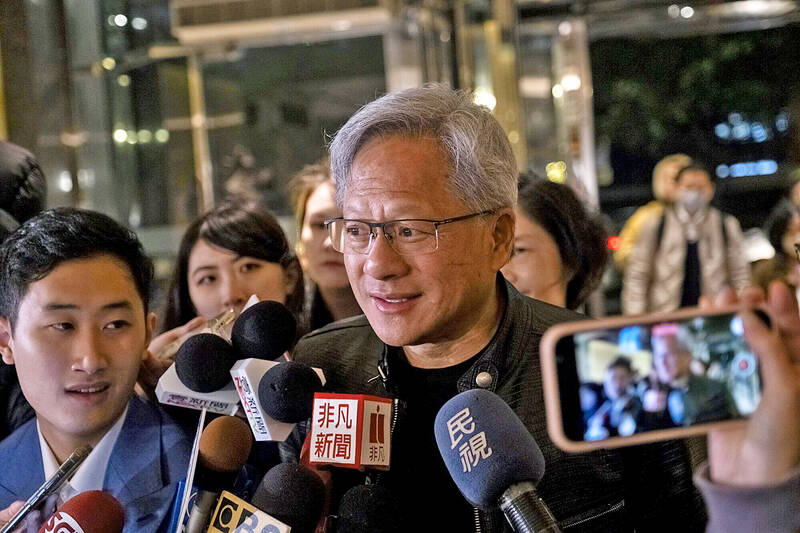Nvidia Corp chief executive officer Jensen Huang (黃仁勳) met with his counterpart at Taiwan Semiconductor Manufacturing Co (TSMC, 台積電) this week to discuss artificial intelligence (AI) chip supply constraints, a major challenge to the AI boom that got going last year.
The heads of the world’s two most valuable chip firms met in Taipei over dinner to discuss the Taiwanese firm’s role as producer of the Nvidia chips that power the majority of generative AI training systems worldwide, Huang told reporters in Taipei.
TSMC founder and prominent industry figure Morris Chang (張忠謀) also joined Huang’s dinner with CEO C.C. Wei (魏哲家) on Wednesday.

Photo: Bloomberg
Huang arrived in Taipei days after embarking on his first visit to China in four years, at a time when the US bars the shipment of Nvidia’s highest-end chips to a geopolitical rival.
While Nvidia has said little about that low-profile tour, Huang talked openly on Thursday about Taiwan’s and TSMC’s pivotal role in Nvidia’s business as well as the broader semiconductor sector.
“The single greatest challenge in AI, of course, is scaling the capacity of AI,” Huang said before heading into his company’s local Lunar New Year celebrations.
“We’re working very hard, TSMC, all of our supply chain partners here, are working very hard to keep up with the demand,” Huang said.
“This year is going to be a huge year,” he added.
EXPORT CONTROLS
Huang declined to answer questions about its China business. The Nvidia chief has previously warned that an escalation in US sanctions, designed to staunch the flow of AI training chips to China, could drive local firms to develop their own alternatives. That could harm US tech leaders in the long run.
The billionaire has name-checked Huawei Technologies Co (華為) — which last year alarmed Washington by including an advanced made-in-China processor in a smartphone — as a potential rival.
Nvidia, which more than tripled its market value last year thanks largely to its pivotal role in AI development, is up another 24 percent this year as investors bet on its sector leadership. It has designed versions of its semiconductors for China that it says are compliant with US restrictions.
The AI boom is helping prop up TSMC’s business. Last week, the company projected a potential rise in capital spending and robust revenue growth, helping trigger a sector-wide stock rally.
Huang on Thursday acknowledged the nation’s most critical industry.
“It’s a rebirth of the computer industry and that’s why Taiwan is so central to that,” he said.
“TSMC, the ecosystem of Taiwan system makers are all going to participate in this new era of computing,” he added.

ADVANCED: Previously, Taiwanese chip companies were restricted from building overseas fabs with technology less than two generations behind domestic factories Taiwan Semiconductor Manufacturing Co (TSMC, 台積電), a major chip supplier to Nvidia Corp, would no longer be restricted from investing in next-generation 2-nanometer chip production in the US, the Ministry of Economic Affairs said yesterday. However, the ministry added that the world’s biggest contract chipmaker would not be making any reckless decisions, given the weight of its up to US$30 billion investment. To safeguard Taiwan’s chip technology advantages, the government has barred local chipmakers from making chips using more advanced technologies at their overseas factories, in China particularly. Chipmakers were previously only allowed to produce chips using less advanced technologies, specifically

BRAVE NEW WORLD: Nvidia believes that AI would fuel a new industrial revolution and would ‘do whatever we can’ to guide US AI policy, CEO Jensen Huang said Nvidia Corp cofounder and chief executive officer Jensen Huang (黃仁勳) on Tuesday said he is ready to meet US president-elect Donald Trump and offer his help to the incoming administration. “I’d be delighted to go see him and congratulate him, and do whatever we can to make this administration succeed,” Huang said in an interview with Bloomberg Television, adding that he has not been invited to visit Trump’s home base at Mar-a-Lago in Florida yet. As head of the world’s most valuable chipmaker, Huang has an opportunity to help steer the administration’s artificial intelligence (AI) policy at a moment of rapid change.

TARIFF SURGE: The strong performance could be attributed to the growing artificial intelligence device market and mass orders ahead of potential US tariffs, analysts said The combined revenue of companies listed on the Taiwan Stock Exchange and the Taipei Exchange for the whole of last year totaled NT$44.66 trillion (US$1.35 trillion), up 12.8 percent year-on-year and hit a record high, data compiled by investment consulting firm CMoney showed on Saturday. The result came after listed firms reported a 23.92 percent annual increase in combined revenue for last month at NT$4.1 trillion, the second-highest for the month of December on record, and posted a 15.63 percent rise in combined revenue for the December quarter at NT$12.25 billion, the highest quarterly figure ever, the data showed. Analysts attributed the

Taiwan Semiconductor Manufacturing Co’s (TSMC, 台積電) quarterly sales topped estimates, reinforcing investor hopes that the torrid pace of artificial intelligence (AI) hardware spending would extend into this year. The go-to chipmaker for Nvidia Corp and Apple Inc reported a 39 percent rise in December-quarter revenue to NT$868.5 billion (US$26.35 billion), based on calculations from monthly disclosures. That compared with an average estimate of NT$854.7 billion. The strong showing from Taiwan’s largest company bolsters expectations that big tech companies from Alphabet Inc to Microsoft Corp would continue to build and upgrade datacenters at a rapid clip to propel AI development. Growth accelerated for